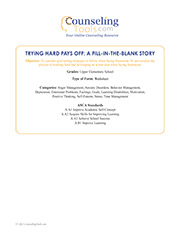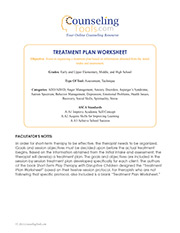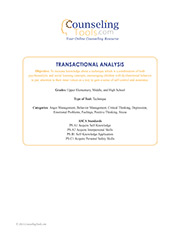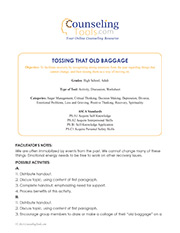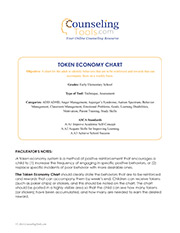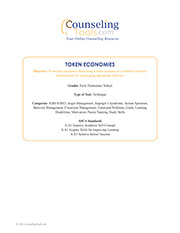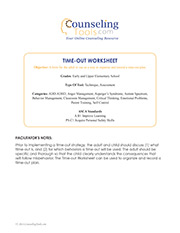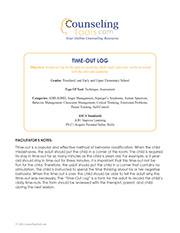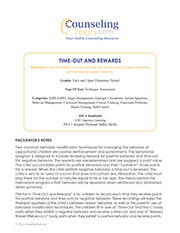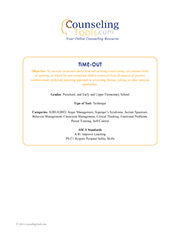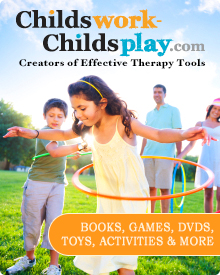-
-
TopicsAnger Management, Anxiety Disorders, Behavior Management, Depression, Emotional Problems, Feelings, Goals, Learning Disabilities, Motivation, Positive Thinking, Self-Esteem, Stress, Time Management
- Objective
To consider goal-setting strategies to follow when facing frustration. To universalize the process of working hard and developing an action plan when facing frustration.
- Types of ToolsWorksheet
- GradesUpper Elementary School
- ASCA StandardsA:A1 Improve Academic Self-Concept, A:A2 Acquire Skills for Improving Learning, A:A3 Achieve School Success, A:B1 Improve Learning
- Number of pages2
-
-
-
TopicsADD/ADHD, Anger Management, Anxiety Disorders, Asperger's Syndrome, Autism Spectrum, Behavior Management, Depression, Emotional Problems, Health Issues, Recovery, Social Skills, Spirituality, Stress
- Objective
Assist in organizing a treatment plan based on information obtained from the initial intake and assessment.
- Types of ToolsAssessment, Technique
- GradesEarly Elementary School, High School, Middle School, Upper Elementary School
- ASCA StandardsA:A1 Improve Academic Self-Concept, A:A2 Acquire Skills for Improving Learning, A:A3 Achieve School Success
- Number of pages4
-
-
-
TopicsAnger Management, Behavior Management, Critical Thinking, Depression, Emotional Problems, Feelings, Positive Thinking, Stress
- Objective
To increase knowledge about a technique which is a combination of both psychoanalytic and social learning concepts, encouraging children with dysfunctional behavior to pay attention to their inner voices as a way to gain a sense of self-control and assurance.
- Types of ToolsTechnique
- GradesHigh School, Middle School, Upper Elementary School
- ASCA StandardsPS:A1: Acquire Self-Knowledge, PS:A2 Acquire Interpersonal Skills, PS:B1 Self-Knowledge Application, PS:C1 Acquire Personal Safety Skills
- Number of pages5
-
-
-
TopicsAnger Management, Critical Thinking, Depression, Divorce, Emotional Problems, Loss & Grieving, Positive Thinking, Recovery, Spirituality
- Objective
To facilitate recovery by recognizing strong emotions from the past regarding things that cannot change, and then tossing them as a way of moving on.
- Types of ToolsActivity, Discussion, Worksheet
- GradesAdult, High School
- ASCA StandardsPS:A1: Acquire Self-Knowledge, PS:A2 Acquire Interpersonal Skills, PS:B1 Self-Knowledge Application, PS:C1 Acquire Personal Safety Skills
- Number of pages3
-
-
-
TopicsADD/ADHD, Anger Management, Asperger's Syndrome, Autism Spectrum, Behavior Management, Classroom Issues, Emotional Problems, Goals, Learning Disabilities, Motivation, Parent Training, Study Skills
- Objective
A chart for the adult to identify behaviors that are to be reinforced and rewards that can accompany them on a weekly basis.
- Types of ToolsAssessment, Technique
- GradesEarly Elementary School
- ASCA StandardsA:A1 Improve Academic Self-Concept, A:A2 Acquire Skills for Improving Learning, A:A3 Achieve School Success
- Number of pages2
-
-
-
TopicsADD/ADHD, Anger Management, Asperger's Syndrome, Autism Spectrum, Behavior Management, Classroom Issues, Emotional Problems, Goals, Learning Disabilities, Motivation, Parent Training, Study Skills
- Objective
To increase awareness about using a token economy as a method of positive reinforcement for encouraging appropriate behavior.
- Types of ToolsTechnique
- GradesEarly Elementary School
- ASCA StandardsA:A1 Improve Academic Self-Concept, A:A2 Acquire Skills for Improving Learning, A:A3 Achieve School Success
- Number of pages3
-
-
-
TopicsADD/ADHD, Anger Management, Asperger's Syndrome, Autism Spectrum, Behavior Management, Classroom Issues, Critical Thinking, Emotional Problems, Parent Training, Self-Control
- Objective
A form for the adult to use as a way to organize and record a time-out plan.
- Types of ToolsAssessment, Technique
- GradesEarly Elementary School, Upper Elementary School
- ASCA StandardsA:B1 Improve Learning, PS:C1 Acquire Personal Safety Skills
- Number of pages2
-
-
-
TopicsADD/ADHD, Anger Management, Autism Spectrum, Behavior Management, Classroom Issues, Critical Thinking, Emotional Problems, Parent Training, Self-Control
- Objective
- Types of ToolsAssessment, Technique
- GradesEarly Elementary School, Preschool, Upper Elementary School
- ASCA StandardsA:B1 Improve Learning, PS:C1 Acquire Personal Safety Skills
- Number of pages2
-
-
-
TopicsADD/ADHD, Anger Management, Asperger's Syndrome, Autism Spectrum, Behavior Management, Classroom Issues, Critical Thinking, Emotional Problems, Parent Training, Self-Control
- Objective
A form for children to record each time they receive points for positive behavior and time-outs for negative behavior.
- Types of ToolsAssessment, Technique
- GradesEarly Elementary School, Upper Elementary School
- ASCA StandardsA:B1 Improve Learning, PS:C1 Acquire Personal Safety Skills
- Number of pages2
-
-
-
TopicsADD/ADHD, Anger Management, Asperger's Syndrome, Autism Spectrum, Behavior Management, Classroom Issues, Critical Thinking, Emotional Problems, Parent Training, Self-Control
- Objective
To increase awareness about time-out as being a motivating, yet extreme form of ignoring, in which the non-compliant child is removed from all sources of positive reinforcement; preferred parenting approach to criticizing, hitting, yelling, or other extreme approaches.
- Types of ToolsTechnique
- GradesEarly Elementary School, Preschool, Upper Elementary School
- ASCA StandardsA:B1 Improve Learning, PS:C1 Acquire Personal Safety Skills
- Number of pages4
-
- Home
- Topics
- ADD/ADHD
- Adoption
- Alcohol and Drug Prevention
- Anger Management
- Anxiety Disorders
- Asperger's Syndrome
- Assertiveness
- Autism Spectrum
- Behavior Management
- Body Image
- Bullying and Cyberbullying
- Career Exploration
- Character Education
- Classroom Issues
- Cliques
- Communication
- Types of Tools
- Grades
- ASCA Standards
- A:A1 Improve Academic Self-Concept
- A:A2 Acquire Skills for Improving Learning
- A:A3 Achieve School Success
- A:B1 Improve Learning
- A:B2 Plan to Achieve Goals
- A:C1 Relate School to Life Experiences
- C:A1 Develop Career Awareness
- C:A2 Develop Employment Readiness
- C:B1 Acquire Career Information
- C:B2 Identify Career Goals
- C:C1 Acquire Knowledge to Achieve Career Goals
- PS:A1: Acquire Self-Knowledge
- PS:A2 Acquire Interpersonal Skills
- PS:B1 Self-Knowledge Application
- PS:C1 Acquire Personal Safety Skills
- About Us
- Contact Us


 Post Forms here
Post Forms here
